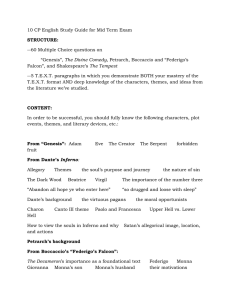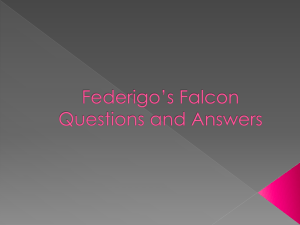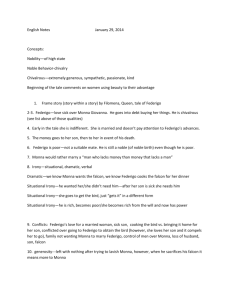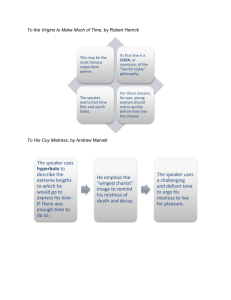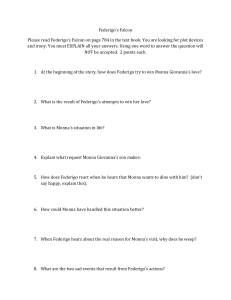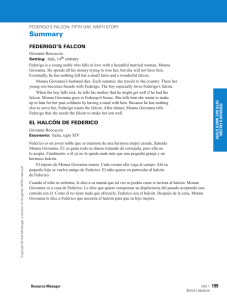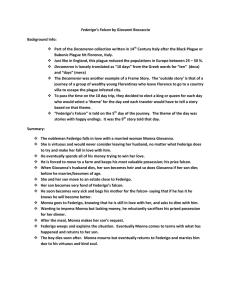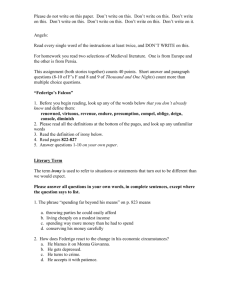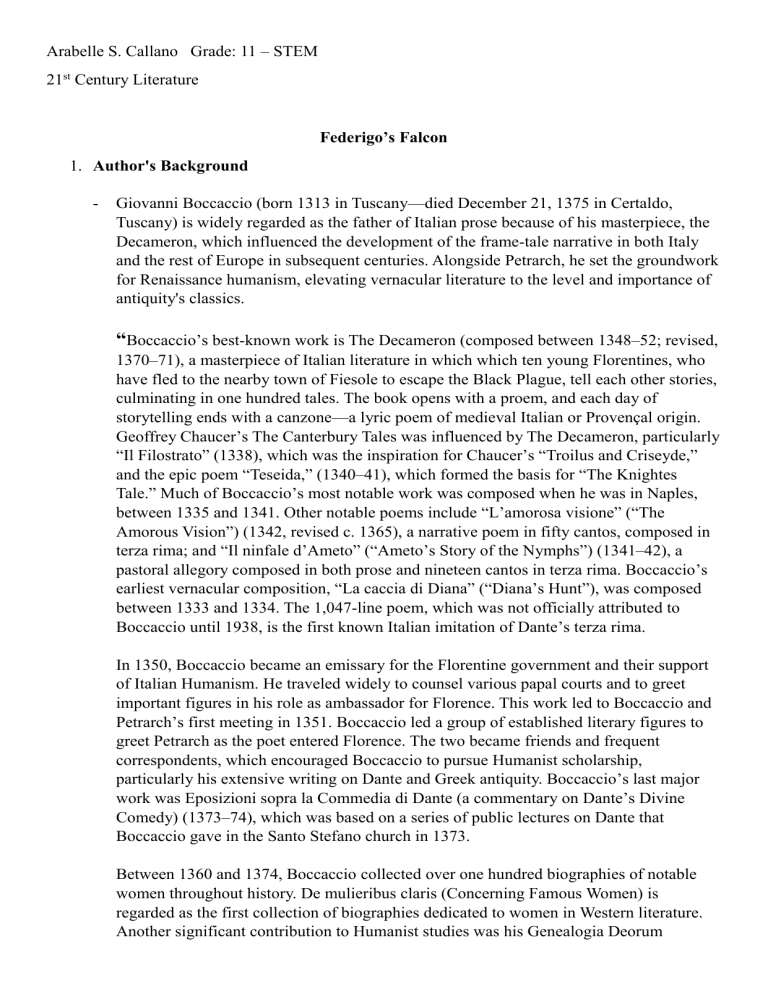
Arabelle S. Callano Grade: 11 – STEM 21st Century Literature Federigo’s Falcon 1. Author's Background - Giovanni Boccaccio (born 1313 in Tuscany—died December 21, 1375 in Certaldo, Tuscany) is widely regarded as the father of Italian prose because of his masterpiece, the Decameron, which influenced the development of the frame-tale narrative in both Italy and the rest of Europe in subsequent centuries. Alongside Petrarch, he set the groundwork for Renaissance humanism, elevating vernacular literature to the level and importance of antiquity's classics. “Boccaccio’s best-known work is The Decameron (composed between 1348–52; revised, 1370–71), a masterpiece of Italian literature in which which ten young Florentines, who have fled to the nearby town of Fiesole to escape the Black Plague, tell each other stories, culminating in one hundred tales. The book opens with a proem, and each day of storytelling ends with a canzone—a lyric poem of medieval Italian or Provençal origin. Geoffrey Chaucer’s The Canterbury Tales was influenced by The Decameron, particularly “Il Filostrato” (1338), which was the inspiration for Chaucer’s “Troilus and Criseyde,” and the epic poem “Teseida,” (1340–41), which formed the basis for “The Knightes Tale.” Much of Boccaccio’s most notable work was composed when he was in Naples, between 1335 and 1341. Other notable poems include “L’amorosa visione” (“The Amorous Vision”) (1342, revised c. 1365), a narrative poem in fifty cantos, composed in terza rima; and “Il ninfale d’Ameto” (“Ameto’s Story of the Nymphs”) (1341–42), a pastoral allegory composed in both prose and nineteen cantos in terza rima. Boccaccio’s earliest vernacular composition, “La caccia di Diana” (“Diana’s Hunt”), was composed between 1333 and 1334. The 1,047-line poem, which was not officially attributed to Boccaccio until 1938, is the first known Italian imitation of Dante’s terza rima. In 1350, Boccaccio became an emissary for the Florentine government and their support of Italian Humanism. He traveled widely to counsel various papal courts and to greet important figures in his role as ambassador for Florence. This work led to Boccaccio and Petrarch’s first meeting in 1351. Boccaccio led a group of established literary figures to greet Petrarch as the poet entered Florence. The two became friends and frequent correspondents, which encouraged Boccaccio to pursue Humanist scholarship, particularly his extensive writing on Dante and Greek antiquity. Boccaccio’s last major work was Eposizioni sopra la Commedia di Dante (a commentary on Dante’s Divine Comedy) (1373–74), which was based on a series of public lectures on Dante that Boccaccio gave in the Santo Stefano church in 1373. Between 1360 and 1374, Boccaccio collected over one hundred biographies of notable women throughout history. De mulieribus claris (Concerning Famous Women) is regarded as the first collection of biographies dedicated to women in Western literature. Another significant contribution to Humanist studies was his Genealogia Deorum Gentilium (On the Genealogy of the Pagan Gods). Scholar Ernest Hatch Wilkins described it as “the chief monument of Boccaccio’s faithful and eager industry as Humanist [sic] […] a mythological encyclopedia in Latin prose, divided into a general proem and fifteen books.” Boccaccio started writing the Genealogia in 1350. Between 1370 and 1371, after allowing a friend to make a copy of the manuscript, numerous copies of the book were made without the consent of Boccaccio, who did not yet regard the Genealogia as complete. While there are between thirty and forty extant manuscripts of the Genealogia, all of which were printed between the fourteenth and fifteenth centuries, the one currently housed in the Bibliothèque Nationale in Paris is regarded as the best. The Genealogia was first printed for the masses in Venice in 1472. Seven later editions, all based on this first printing, were released in the late fifteenth and early sixteenth centuries. Boccaccio died on December 21, 1375 in Certaldo.” - Academy of American Poets, 75 Maiden Lane, Suite 901, New York, NY 10038 Link: https://poets.org/poet/giovanni-boccaccio 2. Background of the work - “Plagued by Love Boccaccio lived during the Italian Renaissance-a time of great achievements in art, music, and literature. Like Chaucer's Canterbury Tales, The Decameron is a collection of tales set within a frame story. The frame, or outer story, is about ten characters who flee to the country to escape a plague that is ravaging Florence, Italy. For ten days they amuse themselves by telling stories, each day selecting a "king" or "queen" who presides over the storytelling. Their 100 tales make up the bulk of The Decameron. As this selection begins, the queen of the day decides that it is time to tell her own story. "Federigo's Falcon" is a tale of courtly love. In medieval times, marriages were often arranged. As a result, couples sometimes looked outside marriage for romantic attachments. This practice was not considered scandalous as long as the love remained idealized. Federigo is devoted to a married woman, Monna Giovanna (mö'nä jō'vä'nä), and will sacrifice anything to gain her love.” – Unknown - “Part of the Decameron collection written in 14 th Century Italy after the Black Plague or Bubonic Plague hit Florence, Italy. Just like in England, this plague reduced the populations in Europe between 25 – 50 %. Decameron is loosely translated as “10 days” from the Greek words for “ten” (deca) and “days” (mera). The Decameron was another example of a Frame Story. The ‘outside story’ is that of a journey of a group of wealthy young Florentines who leave Florence to go to a country villa to escape the plague infested city.To pass the time on the 10 day trip, they decided to elect a king or queen for each day who would select a ‘theme’ for the day and each traveler would have to tell a story based on that theme. “Federigo’s Falcon” is told on the 5th day of the journey. The theme of the day was stories with happy endings. It was the 9th story told that day.” – Dokumen.Tips Link: https://www.lcps.org/cms/lib/VA01000195/Centricity/Domain/5383/Federigos%20Falcon -PDF2014.pdf Link: https://dokumen.tips/documents/federigos-falcon-by-giovanni-boccacciobackground-info-part-of-.html?page=1 3. Setting - Florence, Campi, Farm, House, Tuscany 4. Characters Monna Giovanna Federigo’s Falcon Federigo degli Alberighi Son of Monna Brothers of Monna 5. Characterization Monna Giovanna – A noble lady whom Federigo fell in love with. Federigo’s falcon – Federigo’s prized possession. Federigo degli Alberighi – A nobleman who fell in love with Monna Giovanna who is already married and has a son. Husband of Monna Giovanna – He is the first husband of Monna Giovanna that is rich. Son of Monna – He is the son of Monna Giovanna and her wealthy husband. Brothers of Monna – They are Monna Giovanna's brothers, who would like her to remarry. 6. Character Development - It began with Monna's realization and the lessons she had gained from her experience and she was also appreciative. Her realization and lesson came when she told her brothers that she would rather have a man without money than money that lacks a man. When we take the statement seriously, it indicates that our personality and attitude are more essential than having a lot of money without a decent personality and attitude. Money may be gained, but attitude cannot. She was very appreciative of people for their good works and throughout the story, she learned to accept those people for who they are and regardless of their status in life. 7. 10 main events (highlights) 1st event: Federigo, a nobleman, once fell in love with a married woman named Monna Giovanna. Federigo prepared and presented feasts, participated in jousts and tournaments, and spent his money recklessly in attempt to earn her affection. But, Monna is a moral woman who would never consider leaving her husband, no matter what Federigo attempts to make her fall in love with him. 2nd event: He soon spent all of his money attempting to earn her affection and was taking nothing in, consequently he lost his riches and became impoverished. He was left with nothing but his farm and his prized treasure, a falcon. 3rd event: Monna Giovanna's husband became sick. He was quite wealthy, and when Monna's husband died, her son, who was growing up, became heir, and so does Giovanna. Monna Giovanna was now a widow and she and her son then moved to the country with her son to spend a year on one of her possessions very close to Federigo’s farm. 4th event: It happened that Monna's son and Federigo became friends. He grew so fond of Federigo's falcon after seeing it fly so many times that he wanted he could have it, but he did not dare to ask for it since he saw how precious it was to Federigo. 5th event: Monna's kid became very unwell and asked his mother for the falcon of Federigo, knowing that if he could have the falcon, he would quickly recover. She was shocked to hear that from his son and started pondering what she should do. 6th event: She was preoccupied with how she could get the falcon, knowing that it was the only thing left to Federigo. But , for the sake of her son, Monna went to Federigo, knowing that he is still in love with her, and asked to dine with him in order to get her son's request. 7th event: When she arrived at Federigo's house, she greeted him with feminine elegance, and Federigo greeted her courteously as well. After their conversation, Federigo went in quest of something to present to the lady, but he found nothing, neither money nor a pawnable object. Trying to impress Monna but without funds, he sacrifices his falcon in order to provide the woman something worthy of her as well. 8th event: Federigo headed out to serve the food to Monna and her companion when it was ready. When they had eaten the delicious falcon, Monna kindly told Federigo about his son's request for the falcon. 9th event: As Federigo heard Monna's son's request, he started to weep since he knew from himself that he could not fulfill the request of Monna's son and he explains the situation that he roasted the falcon because he thought it worthy of Monna. Monna scolded Federigo for killing the falcon for a lady, but she praised his grandeur of spirit for what he had done. Monna eventually thanked Federigo for the honor and for his goodwill, and she departed in tears, returning to her son. 10th event: Monna's son died a few days later. Monna mourns for a while, and his siblings urged her to remarry while she is still young and wealthy. She didn't want to remarry but her brothers were so forceful that she remembered Federigo's deed of compassion. She said to her brothers: “I would prefer to remain a widow, if that would please you; but if you wish me to take a husband, you may rest assured that I shall take no man but Federigo degli Alberighi.” Her brothers were surprised and called Monna a fool because Federigo didn't have much money. When her siblings realized that Monna was determined to marry Federigo regardless of his low financial status, but because of his moral and compassionate spirit, her brothers accepted her request and married her to him with all her possessions. Federigo managed his financial affairs with greater care after becoming the spouse of Monna, and they lived happily married. 8. Point of view - Third person 9. Conflict - Man vs. Man: The conflict stems from Fredrigo's battle with his affection for Monna since he was so desperate to impress Monna that he killed and cooked his beloved falcon without giving it a second thought for his love. Also, their misunderstanding as well as a terrible event taking place. He could've informed Monna that he didn't have any money or anything to offer without sacrificing his beloved falcon, and Monna should've told Federigo about her son's desire beforehand. 10. Cultural Implications - For me, the cultural implication in the narrative is that wealth is very essential that they engaged in jousts and tournaments, prepared and provided feasts, and spent their money extravagantly in order to express their love to someone. They also make sacrifices to fulfill the request and show their affection to their loved ones. Like Monna, she sacrificed herself to go to Federigo, knowing that he was still in love with her, in order to make her son happy. Federigo then sacrificed his beloved falcon in the hope of gaining Monna's affection and offering something he thought worthy of Monna. 11. Symbolism - Federigo's love and sacrifice for Monna are symbolized by the falcon. It was incredibly valuable to Federigo and the only thing he had left, but he had the courage and determination to sacrifice it by killing the falcon to express his love for Monna. The falcon represents not just love and sacrifice but also life and death. Since the Son of Monna's request implies that if he could have the falcon, he would instantly recover and his life would resume, But when the falcon was killed, it was only days after the Son of Monna also died. 12. Theme - The story's theme is sacrificial love whether it’s courtly, marital, maternal, or even the love for a pet. They express their love for someone by sacrificing their most prized possessions, such as the falcon and their money. Despite the fact that it was partly about courtly love, the sacrificial love they have shown was more evident. 13. Implication of the title - "Federigo's falcon" was the title of the story since his falcon became the bridge between Federigo and Monna's future and even the death of Monna’s son. Federigo and Monna met since it was her son's desire. They would not meet unless Monna's son requested Federigo's falcon. Additionally, when Federigo's falcon was killed, Monna realized the greatness of Federigo's soul, and as a result, she chose Federigo to be her husband despite his poor status in life. That is why it is the title of the story.
